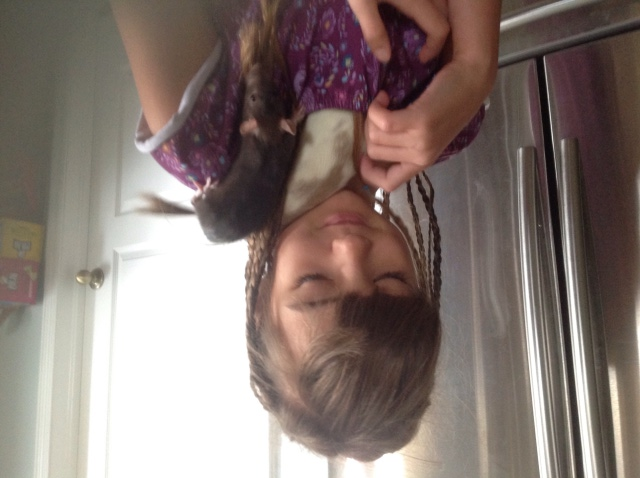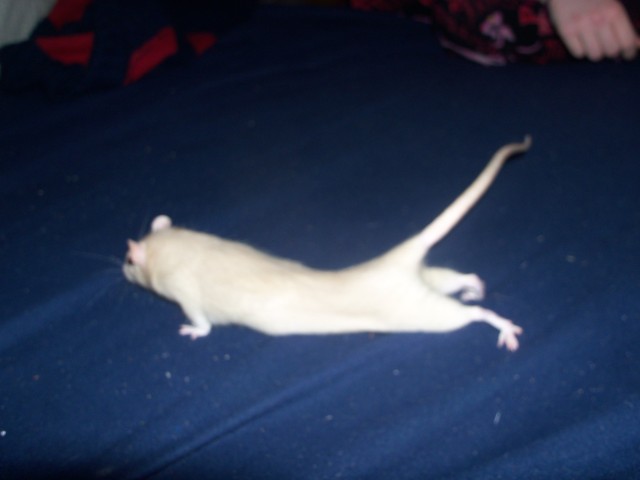QuestionI have a young female fancy rat who is less than a year old. About a month ago I noticed on her front legs she was losing her fur from the top of her foot to about mid way on her leg. I put her in a separate cage thinking maybe it was from stress. I didn't want her to be alone because she was in a huge cage with eight other rats so I put another rat in the cage with her. Yesterday I noticed on the inside of her back legs and on her stomach her fur is very thin or falling out and now I can see her skin. I noticed on the other rat that is also in her cage has some little patches on her stomach also that are thinning.
What is the cause of this and do I need to take them to the vet and if so what meds should they be put on?
AnswerHI Lorrie
I do have a couple of questions for you that may help both you and your vet figure out what to do to help your little girl.
If she's a fawn, beige, white, champaigne, or other light colored girl, or if she's a rex, wire, or harley coat, (the curlier coats), she may have a very common man-made genetic trait. In this case, there isn't much you can do ecxept try to keep the bare area protected.
Some lighter colors and some odd-hair type ratties lose hair around their legs, front of their necks, and by their tails. This, sadly, man-made problem originated during medical breeding tests in in the early 1900's. Animals were bred to become hairless around pheremone producing glands for the testing of perfumes and (medicine) flavorings. The idea was to disguise the scent of the animal, just as doctors hide the taste of medications for children, to make them more edible.
However, there are more reasons for this to occur. Animals, like humans, develop allergies. Some of us are intolerant to chemeicals from birth, while others develop an inability to handle these later in life. Your rat girl may have a new allergy.
The vet will call allergies of the skin "dermatitis", a generic term that covers anything from rashes to scaling to drying, to balding. Some rats have seasonal allergies, just as we do. Dyes in toys, scents in litter, laundry changes, and even a change in household air freshener can cause your rat to react with changes in hair and skin.
Then there are behavior issues. I'm glad you're getting her to a vet, but here's a guide to help both you and your doctor decide what's going on.
If she has a cage mate, watch to see if her partner is 'barbering' her. Barbering happens when one rat grooms another to the point where hair is unable to grow. It's VERY common for rats to overgroom. The dominant female will work to remove the scents of the non-dominant one so that any mating-ready male in the area will only smell the queen of the cage. Older rats will often do this to younger rats until the dominats are no longer interested in breeding, (around 18-22 months).
Barbering also happens when a rat is nervous, as you smartly considered. Unless your ratty girl has shown other signs of aggitated behavior, she probably isn't over grooming herself. A nervous nelly will groom herself the same way you or I would have a nial-biting habit, or other quirks. Since both of your girls are showing signs of balding, I'm guessing that it's something other than a nervous tick.
First, see if you have changed anything in your routine from the days she was furry to now. Have you changed foods? Are treats different? Does something smell unusual near her cage? Is there a new dog/cat, or other animal? Rats can be allergic to other pets, garden flowers, plants, or even changes in your laundry detergents.
Secondly, has your rat been given any proteins for more than 10 -15% of her diet? Although wild rats survive on scavaging the leftovers of the world, pet rats don't carry the same abilities to digest meats or nuts. Often they'll develop scabs, bald batches, and even red patchy skin when there is too much protein in their daily diet. If you are using a store bought food, read the label to see how much protein is in the diet. Anything over 15-17% is likely the problem.
Vitamins for rodents can help, but if you have these in their water, they may cause more problems. Liquid vitamins in water bottles create bacteria. Never leave your vitamins in the sun as this could prove toxic if allowed to sit over time.
If you have been using vitamin supplements, just add a few drops to their daily diet three or four times a week. Most vitamin mixes are too strong for pet rats, so not much is needed if the diet includes fresh veggies/fruits or lab blocks. By adding sweet grass, or other greens, you could eliminate the need for most vitamin supplements.
To help their coats, you can drop a tiny bit of Vitamin E onto their foods once or twice a week. Not only will the E help her skin, but her hair will become shinier, smoother, softer, and her tail may even appear cleaner.
Make a note for your vet regarding the condition of your rats ears, gential area, and nails. Rodent lice will appear as slight brown dirt spots. This form of parasite will not attack humans. If her nails are chipping, her ears show signs of bladness, or her tail appears chapped, she may have signs of other skin conditions. Also tell the vet if the hairs appear to be growing clear before they disappear.
I hope that helps! I hope your girls do well since you sound like a terrific ratty mom!
Cathe

 Is this cage big enough for two male rats?
QuestionQUESTION: I saw this cage on petsmart.com and w
Is this cage big enough for two male rats?
QuestionQUESTION: I saw this cage on petsmart.com and w
 cookie has a infected tooth
Question
Cookie my dog and cookie
Today I
cookie has a infected tooth
Question
Cookie my dog and cookie
Today I
 Cookie & Stella
Question
Cookie and Stella
Hi Irene,
Things are
Cookie & Stella
Question
Cookie and Stella
Hi Irene,
Things are
 I worry that my pet rat has fallen ill.
Question
Lucy
My pet rat Lucy is about 9 months old, fe
I worry that my pet rat has fallen ill.
Question
Lucy
My pet rat Lucy is about 9 months old, fe
 Rat behaviors.
Question
Cricket Playing
A little background: Al
Rat behaviors.
Question
Cricket Playing
A little background: Al